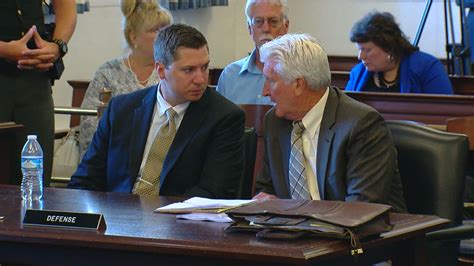
Lawyers are sharing the precise moments they knew a case was doomed, revealing a mix of comical courtroom blunders, devastating witness testimonies, and outright bizarre client behavior that led to courtroom defeat. From ill-prepared clients to unexpected evidence, the anecdotes shared online highlight the unpredictable nature of legal proceedings.
The legal profession, often portrayed as a realm of meticulous preparation and strategic maneuvering, can be surprisingly susceptible to unforeseen calamities. A recent online discussion, sparked by legal professionals sharing their “that’s when I knew we were going to lose” moments, offers a candid glimpse into the unpredictable realities of courtroom drama. These shared experiences, ranging from cringe-worthy client behavior to unexpected evidentiary revelations, serve as cautionary tales and offer a sobering reminder that even the most carefully constructed legal strategies can crumble in the face of human error or unforeseen circumstances. The discussion underscores the inherent risks and uncertainties that legal professionals navigate daily.
“I knew we were toast when my client, on trial for assault, winked at the jury while the victim was testifying,” one lawyer recounted, encapsulating the essence of many shared anecdotes. These stories, collected and shared across social media platforms, provide a raw and often humorous perspective on the potential pitfalls of litigation. The incidents highlight how much the outcome of a trial can depend on factors beyond the control of the legal team.
These shared experiences underscore the crucial role that human behavior, unexpected evidence, and sheer luck can play in determining the outcome of a legal battle. They also emphasize the need for lawyers to be adaptable, quick-thinking, and prepared for anything, as the best-laid plans can quickly unravel in the unpredictable environment of a courtroom. The legal professionals’ reflections serve as lessons for newer lawyers, reminding them of the importance of thorough client preparation, comprehensive evidence review, and maintaining composure under pressure.
Common Threads of Disaster
Several recurring themes emerge from the collected anecdotes, shedding light on the common pitfalls that can derail a legal case.
-
The Uncooperative Client: Perhaps the most frequent source of despair for lawyers is the client who refuses to follow instructions or sabotages their own defense through inappropriate behavior. Stories abound of clients contradicting their lawyers’ advice, making inflammatory statements, or simply failing to appear in court. “My client showed up to court drunk,” one lawyer admitted. “He then proceeded to loudly heckle the judge.”
-
The Surprise Witness/Evidence: The sudden emergence of unexpected witnesses or previously undisclosed evidence can be a devastating blow, particularly if it contradicts the established narrative. “We were halfway through the trial when the prosecution produced a video of my client committing the crime,” another lawyer shared, illustrating the potential for last-minute surprises.
-
The Catastrophic Testimony: A witness’s testimony, whether from the opposing side or even from one’s own, can dramatically alter the course of a trial. A poorly prepared or unreliable witness can damage a case beyond repair. Lawyers recall moments when their own witnesses contradicted their prior statements or revealed damaging information under cross-examination.
-
The Technical Glitch: In an increasingly digital world, technology plays a crucial role in legal proceedings. However, technical malfunctions can disrupt the flow of a trial and undermine a lawyer’s presentation. “My PowerPoint crashed during my opening statement,” one lawyer lamented. “And I couldn’t get it back up for 20 minutes.”
-
The Judge’s Intervention: A judge’s rulings, comments, or even their demeanor can significantly influence a jury’s perception of a case. Lawyers frequently recount instances where a judge’s apparent bias or unfavorable rulings signaled impending defeat. “The judge openly scoffed at my argument,” a lawyer explained. “That’s when I knew we were in trouble.”
Specific Examples of Legal Mishaps
The anecdotes shared by legal professionals offer vivid illustrations of the ways in which a case can go awry.
One lawyer described representing a client accused of theft. Despite the lawyer’s advice to remain silent, the client insisted on testifying. On the stand, the client not only admitted to the theft but also implicated himself in several other unsolved crimes. The lawyer knew the case was lost the moment the client began his unsolicited confession.
Another lawyer recounted representing a defendant in a personal injury case. The plaintiff claimed to have suffered debilitating back pain as a result of the defendant’s negligence. However, during cross-examination, the lawyer presented photographic evidence showing the plaintiff actively participating in a marathon just weeks after the alleged injury. The lawyer explained that at that moment, he knew the jury would rule in favor of his client.
Another attorney shared a story of representing a client in a contract dispute. The case hinged on the interpretation of a specific clause in the contract. However, during oral arguments, the lawyer realized that the contract he had been relying on was an outdated version. The opposing counsel produced the correct contract, which clearly favored their client. The lawyer knew at that point that he was fighting a losing battle.
A lawyer told of a time he was representing a client in a DUI case. The lawyer advised his client not to take the stand. However, against his attorney’s recommendation, the client chose to testify. On the stand, the client admitted to having “a couple of beers” before driving, which contradicted the lawyer’s planned defense of mistaken identity. The client’s admission sealed the fate of the case.
One public defender shared a story of representing a client charged with drug possession. During jury selection, one potential juror stated that he had been a drug addict for twenty years but had been clean for five years. Against the attorney’s advice, the client insisted that the attorney strike the juror for cause. The judge denied the challenge for cause. So the lawyer struck the juror using a peremptory challenge. The jury that was ultimately selected found the client guilty. After the trial, one of the jurors approached the lawyer and stated that the juror who was struck for cause would have been the only juror to vote to acquit. That’s when the attorney realized that the client’s overconfidence had caused them to lose the case.
Another lawyer recalled a medical malpractice case in which the critical evidence was a series of X-rays. The lawyer had meticulously prepared his presentation, including enlarged prints of the X-rays to display to the jury. However, when he went to present the X-rays, he discovered that they were the wrong ones. In his panic, the lawyer fumbled through his files, unable to locate the correct X-rays. The judge, visibly frustrated, instructed the lawyer to proceed without them. The lawyer knew at that moment that his case had suffered a fatal blow.
The Importance of Preparation and Adaptability
While the shared anecdotes highlight the potential for things to go wrong in a legal case, they also underscore the importance of preparation and adaptability. Lawyers who are well-prepared, thorough in their investigation, and able to think on their feet are better equipped to handle unexpected challenges.
“The key is to anticipate as many potential problems as possible,” one experienced lawyer advised. “You can’t control everything that happens in court, but you can control how you respond.”
Adaptability is also critical. Lawyers must be able to adjust their strategy in response to new information or changing circumstances. A rigid adherence to a pre-determined plan can be disastrous if the facts on the ground shift. The best lawyers are those who can think creatively and find innovative solutions to unexpected problems.
These shared stories illustrate that even seasoned lawyers can face unexpected challenges in the courtroom. It serves as a reminder that legal success is not guaranteed, no matter how strong a case may appear on paper. The shared experiences underscore the need for humility, resilience, and a healthy dose of humor in the face of adversity. The practice of law demands unwavering diligence, a commitment to justice, and the ability to navigate the unpredictable currents of the legal system. These narratives are beneficial for young and aspiring lawyers, offering real-world insights beyond textbooks and classrooms, making them more aware and ready for the challenges ahead.
The Psychological Toll of Legal Mishaps
The anecdotes also implicitly touch upon the psychological toll that these “that’s when I knew we were going to lose” moments can take on legal professionals. Lawyers invest significant time, energy, and emotional resources into their cases, and witnessing a case unravel despite their best efforts can be deeply disheartening.
“It’s easy to second-guess yourself after a loss,” one lawyer confessed. “You replay the trial in your head, wondering what you could have done differently.”
The pressure to win can be intense, particularly in high-stakes cases. Lawyers may feel personally responsible for the outcome, even when the result is beyond their control. This can lead to stress, anxiety, and even burnout.
It’s important for lawyers to have strategies for coping with the psychological challenges of the profession. This may include seeking support from colleagues, mentors, or therapists. Maintaining a healthy work-life balance and engaging in activities outside of work can also help lawyers manage stress and maintain their well-being.
Ethical Considerations in the Face of Adversity
The shared anecdotes also raise important ethical considerations. Lawyers have a duty to zealously advocate for their clients, but they also have a responsibility to uphold the integrity of the legal system.
When a case begins to go south, lawyers may face difficult ethical dilemmas. They must weigh their obligation to their client against their duty to the court and to the public.
For example, a lawyer may discover that their client has committed perjury. In such a situation, the lawyer must decide whether to disclose the perjury to the court, even if it means harming their client’s case. The ethical rules governing these situations can be complex and may vary depending on the jurisdiction.
Lawyers must also be careful not to engage in unethical or illegal conduct in an attempt to salvage a losing case. This includes fabricating evidence, intimidating witnesses, or making false statements to the court. Such behavior can have serious consequences, including disciplinary action, criminal charges, and damage to their reputation.
The Role of Humor in the Legal Profession
Despite the serious nature of the legal profession, humor plays an important role in helping lawyers cope with stress and maintain perspective. The shared anecdotes, while often cautionary, are also frequently laced with humor.
“You have to be able to laugh at yourself sometimes,” one lawyer noted. “Otherwise, you’ll go crazy.”
Humor can be a valuable tool for defusing tense situations in the courtroom and for building rapport with clients, judges, and juries. It can also help lawyers to maintain a sense of perspective and to avoid taking themselves too seriously.
The ability to find humor in even the most challenging situations can be a sign of resilience and adaptability. It can also be a reminder that, despite the high stakes, the legal profession is ultimately a human endeavor, with all the foibles and imperfections that entails.
The Future of Legal Practice: Adapting to Uncertainty
The anecdotes shared by legal professionals offer valuable lessons for the future of legal practice. As the legal landscape becomes increasingly complex and unpredictable, lawyers must be prepared to adapt to new challenges and to embrace uncertainty.
This requires a commitment to lifelong learning, a willingness to experiment with new technologies and strategies, and a dedication to ethical conduct. It also requires a recognition that legal success is not solely dependent on technical expertise, but also on emotional intelligence, communication skills, and the ability to build strong relationships.
The legal profession is constantly evolving, and lawyers who are able to adapt to change will be best positioned to thrive in the future. By learning from the mistakes of others and by embracing a growth mindset, lawyers can navigate the challenges of the legal system and provide effective representation for their clients.
Frequently Asked Questions (FAQ)
-
What are some common reasons why a legal case might “go south” as mentioned in the article?
Several factors can contribute to a case unraveling. These include uncooperative clients who disregard advice, the surprise emergence of unexpected witnesses or evidence, catastrophic testimony from one’s own or the opposing side’s witnesses, technical glitches that disrupt presentations, and unfavorable rulings or displays of bias from the judge.
-
How important is client preparation in preventing these courtroom disasters?
Client preparation is extremely important. A client who is well-prepared, understands the legal process, and follows their lawyer’s instructions is far less likely to make damaging statements or engage in behavior that could jeopardize the case. Thorough preparation also helps the lawyer anticipate potential problems and develop strategies to address them.
-
What ethical considerations do lawyers face when they realize a case is going badly?
When a case falters, lawyers must navigate difficult ethical dilemmas. They must balance their duty to zealously advocate for their client with their responsibility to uphold the integrity of the legal system. This can involve deciding whether to disclose client perjury or avoiding unethical tactics to salvage the case.
-
How do lawyers cope with the psychological stress of experiencing a major setback in court?
Lawyers cope with the psychological stress of losing cases in various ways. Strategies include seeking support from colleagues, mentors, or therapists, maintaining a healthy work-life balance, and engaging in activities outside of work to manage stress and maintain their well-being. Humor and the ability to maintain perspective also play a role.
-
In what ways can newer lawyers learn from the experiences shared in the article to better prepare themselves for their careers?
New lawyers can learn from the shared anecdotes by understanding the importance of thorough client preparation, comprehensive evidence review, and maintaining composure under pressure. By recognizing the potential pitfalls that can derail a case, they can proactively work to mitigate these risks and develop the adaptability and resilience needed to navigate the unpredictable nature of legal proceedings. They should learn from others’ mistakes to prepare for a legal career.
Expanded Analysis and Further Context
The shared experiences of lawyers facing courtroom disasters offer a revealing look into the complexities and uncertainties inherent in the legal system. Beyond the specific anecdotes, these stories highlight several broader themes that are essential for understanding the practice of law.
The Limits of Control: One of the most significant takeaways from these accounts is the realization that lawyers, despite their expertise and preparation, have limited control over the outcome of a case. While they can meticulously research the law, gather evidence, and craft compelling arguments, they cannot control the behavior of their clients, the testimony of witnesses, or the decisions of judges and juries.
This lack of control can be particularly frustrating for lawyers who are accustomed to being in command of their environment. The courtroom is a dynamic and unpredictable space, where unexpected events can quickly undermine even the most carefully laid plans. Lawyers must be prepared to adapt to these unforeseen circumstances and to make quick decisions under pressure.
The Human Element: The legal system is often portrayed as a rational and objective process, governed by strict rules and procedures. However, the shared anecdotes reveal the significant role that human emotions, biases, and errors play in shaping legal outcomes.
Clients may act irrationally out of fear, anger, or desperation. Witnesses may be unreliable or biased. Judges may have personal preferences or prejudices. And juries may be swayed by emotions rather than facts.
Lawyers must be aware of these human factors and take them into account when preparing and presenting their cases. They must also be able to connect with clients, witnesses, judges, and juries on a human level, building trust and rapport.
The Power of Narrative: Legal cases are ultimately about telling stories. Lawyers must construct a compelling narrative that persuades the judge or jury to see the case from their client’s perspective.
The most effective narratives are those that are clear, concise, and emotionally resonant. They must also be supported by credible evidence. However, even the most compelling narrative can be undermined by a single damaging piece of evidence or a poorly performing witness.
Lawyers must be skilled storytellers, able to weave together facts, emotions, and arguments into a cohesive and persuasive whole. They must also be able to anticipate and address the opposing side’s narrative, highlighting its weaknesses and inconsistencies.
The Importance of Humility: The shared anecdotes serve as a reminder that even the most experienced lawyers can make mistakes. The legal profession is a demanding and challenging one, and setbacks are inevitable.
Lawyers must be able to learn from their mistakes and to avoid repeating them in the future. They must also be willing to seek advice and guidance from colleagues and mentors.
Humility is an essential quality for lawyers, as it allows them to remain open to new ideas and to recognize their own limitations. It also helps them to build strong relationships with clients, colleagues, and judges.
The Role of Technology: Technology is playing an increasingly important role in the legal profession. Lawyers use technology for everything from legal research to document management to courtroom presentations.
However, technology can also be a source of frustration and even disaster. Technical glitches can disrupt courtroom proceedings, and electronic evidence can be difficult to manage and present effectively.
Lawyers must be technologically proficient and able to troubleshoot technical problems quickly and efficiently. They must also be aware of the ethical implications of using technology in the legal profession, such as data privacy and security.
The Future of Legal Education: The shared anecdotes have implications for legal education. Law schools must do more than simply teach students the law. They must also prepare them for the practical realities of legal practice, including the challenges of dealing with difficult clients, managing unexpected events, and navigating the complexities of the courtroom.
Law schools should incorporate more experiential learning opportunities into their curriculum, such as mock trials, clinics, and internships. They should also teach students the importance of communication skills, emotional intelligence, and ethical decision-making.
By providing students with a more comprehensive and practical legal education, law schools can better prepare them for the challenges and rewards of the legal profession.
Conclusion
The shared anecdotes of lawyers facing courtroom disasters offer a valuable glimpse into the unpredictable and often challenging nature of the legal profession. These stories highlight the importance of preparation, adaptability, humility, and a healthy dose of humor. They also underscore the need for lawyers to be aware of the human element in legal proceedings and to be skilled storytellers. By learning from the mistakes of others and by embracing a growth mindset, lawyers can navigate the complexities of the legal system and provide effective representation for their clients. The lessons learned from these experiences will prove useful to lawyers throughout their careers.









